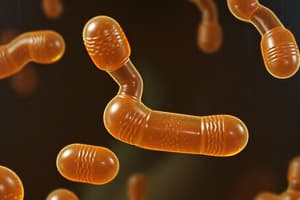Podcast
Questions and Answers
Wat is een van de belangrijkste mechanismen van antibioticaresistentie?
Wat is een van de belangrijkste mechanismen van antibioticaresistentie?
- Beperking van de opname van een medicijn (correct)
- Verhoging van de effectiviteit van antibiotica
- Vermindering van de productie van antibiotica
- Versterking van de opname van een medicijn
Hoe kunnen ziekteverwekkers antibiotica inactiveren?
Hoe kunnen ziekteverwekkers antibiotica inactiveren?
- Door hun stabiliteit te vergroten
- Door hun activiteit te verhogen
- Door hun verspreiding te verminderen
- Door ze onschadelijk te maken (correct)
Wat zijn enkele ernstige gevolgen van antibioticaresistentie?
Wat zijn enkele ernstige gevolgen van antibioticaresistentie?
- Verhoogde effectiviteit van antibiotica
- Verlaging van de kosten van antibiotica
- Behandelingsmislukkingen en de noodzaak van alternatieve behandelingen (correct)
- Verbeterde respons op standaardbehandelingen
Wat gebeurt er als ziekteverwekkers de doelwitten van antibiotica wijzigen?
Wat gebeurt er als ziekteverwekkers de doelwitten van antibiotica wijzigen?
Hoe versnellen ziekteverwekkers de ontwikkeling van resistente stammen?
Hoe versnellen ziekteverwekkers de ontwikkeling van resistente stammen?
Hoe verminderen ziekteverwekkers de effectiviteit van antibiotica?
Hoe verminderen ziekteverwekkers de effectiviteit van antibiotica?
Wat is een mogelijke bedreiging van antibioticaresistentie volgens de tekst?
Wat is een mogelijke bedreiging van antibioticaresistentie volgens de tekst?
Welke strategie wordt genoemd als een sleutel tot het voorkomen van antibioticaresistentie?
Welke strategie wordt genoemd als een sleutel tot het voorkomen van antibioticaresistentie?
Wat kan resulteren uit de antibioticaresistentie volgens de tekst?
Wat kan resulteren uit de antibioticaresistentie volgens de tekst?
Wat wordt genoemd als een manier om antibioticaresistentie te voorkomen?
Wat wordt genoemd als een manier om antibioticaresistentie te voorkomen?
Wat kan het gevolg zijn van overmatig en onjuist gebruik van antibiotica?
Wat kan het gevolg zijn van overmatig en onjuist gebruik van antibiotica?
Hoe kunnen medische procedures zoals gewrichtsvervangingen en orgaantransplantaties worden bedreigd door antibioticaresistentie?
Hoe kunnen medische procedures zoals gewrichtsvervangingen en orgaantransplantaties worden bedreigd door antibioticaresistentie?
Waarom is het belangrijk om patiënten voor te lichten over het voltooien van de voorgeschreven antibioticakuur?
Waarom is het belangrijk om patiënten voor te lichten over het voltooien van de voorgeschreven antibioticakuur?
Wat kan bijdragen aan het identificeren van gebieden waar resistentie zich ontwikkelt?
Wat kan bijdragen aan het identificeren van gebieden waar resistentie zich ontwikkelt?
Flashcards are hidden until you start studying
Study Notes
Antibiotic Resistance: Mechanisms, Consequences, and Prevention
Mechanisms of Antibiotic Resistance
Antibiotic resistance occurs when germs like bacteria and fungi develop the ability to defeat the drugs designed to kill them, making infections difficult or impossible to treat. The main mechanisms of resistance include:
- Limiting uptake of a drug: Germs can restrict access to antibiotics by changing their entryways or limiting the number of entryways.
- Modification of a drug target: Germs can alter the targets of antibiotics, making them less susceptible to the drug's effects.
- Inactivation of a drug: Germs can inactivate antibiotics, rendering them unable to kill the bacteria or fungi.
- Active efflux of a drug: Germs can actively pump antibiotics out of their cells, reducing the drug's effectiveness.
These mechanisms can be native to the germs or acquired from other germs, and they can share their resistance mechanisms with other germs, accelerating the development of resistant strains.
Consequences of Antibiotic Resistance
Antibiotic resistance has several serious consequences, including:
- Treatment failures: Resistant infections may not respond to antibiotics, leading to the need for alternative treatments, which can be less effective or more expensive.
- Increased morbidity and mortality: Resistant infections can spread and become more difficult to treat, resulting in more severe infections and higher death rates.
- Threat to medical advances: Many medical procedures and treatments, such as joint replacements, organ transplants, and cancer therapy, rely on the ability to fight infections using antibiotics. Antibiotic resistance could jeopardize these advances and potentially lead to more frequent use of last-resort drugs.
Prevention of Antibiotic Resistance
Preventing antibiotic resistance involves addressing the root causes of resistance and promoting responsible use of antimicrobial agents. Key strategies for prevention include:
- Reducing antibiotic use: Decreasing the overuse and misuse of antibiotics in humans, animals, and plants can help curb the development of drug-resistant pathogens.
- Ensuring proper prescribing and dispensing: Healthcare professionals should follow guidelines for prescribing and dispensing antibiotics, including the appropriate use of antibiotics for the right conditions, dosage, and duration.
- Promoting patient education: Patients should be informed about the importance of completing the full course of prescribed antibiotics and not sharing antibiotics with others.
- Monitoring and surveillance: Regular monitoring and surveillance of antimicrobial resistance patterns can help identify areas where resistance is developing and inform the development of new strategies to combat it.
- Investing in research and development: Continuous research and development of new antibiotics and understanding the mechanisms of resistance can help stay ahead of the evolving threat of antibiotic resistance.
In conclusion, antibiotic resistance is a significant global health threat that requires a comprehensive approach to prevention and control. By understanding the mechanisms of resistance, raising awareness about the consequences of antibiotic resistance, and implementing effective prevention strategies, we can help ensure the continued effectiveness of antimicrobial treatments and protect the health of millions of people worldwide.
Studying That Suits You
Use AI to generate personalized quizzes and flashcards to suit your learning preferences.
Description
Explore the mechanisms, consequences, and prevention strategies related to antibiotic resistance. Understand how germs develop resistance to antibiotics, the serious implications of antibiotic resistance, and the key strategies to prevent its spread.




